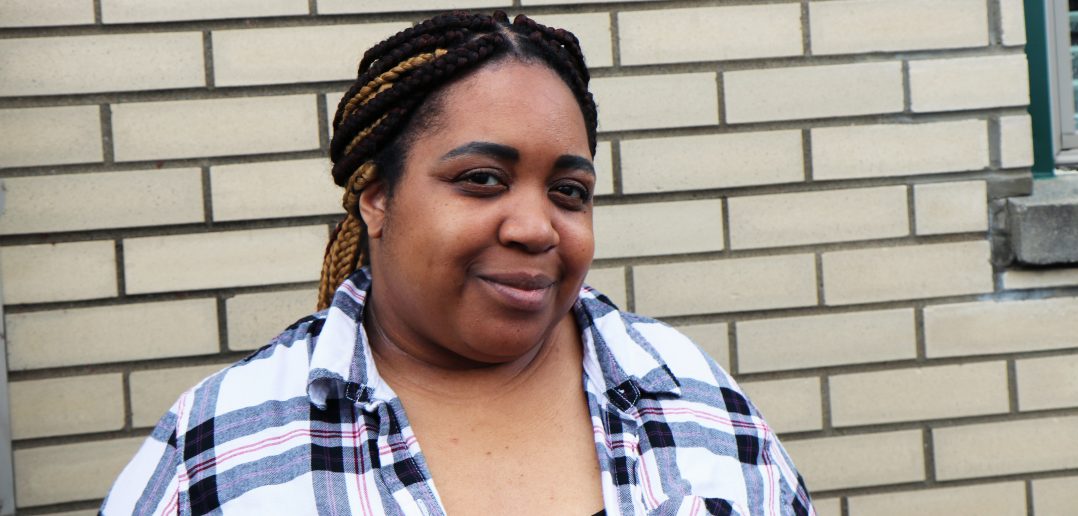SCHENECTADY — Zarinah Muhammad endured a work nightmare that threatened her job, her career and her family.
Through personal strength and support from our union, she has finally found justice.
The outcome of Muhammad’s case has led to a major, important change to how certain disciplinary charges and Justice Center matters are handled against workers.
The nightmare began on Labor Day weekend 2014. Coming off a double shift as a direct support assistant at a state Office for People With Developmental Disabilities (OPWDD) group home, Muhammad was looking forward to getting home to her kids.
On her way out, Muhammad’s supervisor pulled her aside and told her an individual had accused her of illegal activity and that she was being put out of work.
Subsequently, her name was also added to the Justice Center’s “Staff Exclusion List,” which would prevent Muhammad, potentially permanently, from working with vulnerable people, even in other occupations such as nursing.
Muhammad went home, stunned and reeling from the accusation.
Dual, difficult paths
For workers without Justice Center oversight, it’s hard to imagine the level of power the entity holds over employees. Union members benefit from contracts outlining a process for discipline. However, if the Justice Center has oversight of your workplace, employees face dual paths to get back to work and clear their name.
First, the charges must be settled with the employer and then charges must be resolved with the Justice Center. Winning the case against your employer was no guarantee of a victory against the Justice Center.
Sadly, for direct-care workers like Muhammad, false accusations and unfounded disciplines are all too common.
“It happens here all the time,” Capital District DDSO Local President Bill Loya said. “We’ve had numerous cases where individuals have told staff that they were going to run them out of the house.”
Employees said they feel they work in an upside-down world where guilt is the default mode, policies are selectively enforced and the fear of discipline weighs heavy on the psyche.
OPWDD employees note they have also seen a shift in the individual population, mostly stemming from “forensic” cases in which the individuals who, in addition to a diagnosed developmental disability, are either in prison, in a mental health facility or in need of transitional housing upon institutional release.
OPWDD group homes serve a wide range of individuals, some who are considered “high functioning,” as well as others with severe developmental disabilities who need assistance with all aspects of living, from bathing, dressing, eating and walking.
The forensic population in group homes are “smarter and more street smart than any of the individuals we’ve worked with in the past,” Loya said.
Just how many Justice Center investigations are initiated by individuals in OPWDD is unknown, as the Justice Center did not reply to CSEA’s request for statistics on self-reported cases.
‘I was scared out of my mind’
Muhammad describes herself as a “by the book” person who tried to live up to the mission of OPWDD, which states “We help people with developmental disabilities live richer lives.”
Muhammad previously worked in a group home where she witnessed a skilled, caring house manager driven out by false accusations. A resident who disliked the manager’s adherence to house rules had boldly pronounced he was “coming after her,” and did.
The second time she was forced out of work on false charges, the house manager gave up and retired. “It’s not worth it,” the defeated woman told Muhammad.
Muhammad didn’t have that option. A single mom who has four children and custody of her grandson, she was nervous when her accuser taunted her, ‘I’m gonna get rid of you.’
In early October 2014, Muhammad was visited by a Justice Center investigator. She said that he was very aggressive, telling her ‘everything would be OK if she just admitted to the charges.’
“I’m not admitting anything, because I didn’t do anything,” she told him.
After that meeting, she turned to our union for help.
By the time the investigator returned, Muhammad had been counseled by Loya and knew her rights.
“I am working with my union and I will not speak with you,” she told the investigator. He never returned.
As she waited for the outcome of the case, Muhammad took care of her kids and strung together three low-paying personal care jobs to keep finances afloat. She worried about her ability to provide for her children.
“I was scared out of my mind,” Muhammad said. “I was trying to become a [licensed practical nurse], but was afraid to spend the money in case the Justice Center kept me on the Staff Exclusion List.”
Standing strong
It was a difficult time, but Muhammad never felt alone. As a CSEA member, she relied on her network of union allies to represent her at every step of her fight.
Working with her local, including Loya, as well as CSEA Labor Relations Specialist Charles Barley and CSEA
Senior Associate Counsel Jennifer Zegarelli, who handled the case on behalf of our union, Muhammad’s case eventually went to arbitration.
The Capital District DDSO Local even helped secure an expert witness to counter false claims. Muhammad was highly credible. Her accuser was not.
The arbitrator, in ruling in favor of CSEA on behalf of Muhammad in May 2015, wrote, “After observing [the accuser]testify under direct and cross examination, I note that he speaks clearly and directly, and responds appropriately to questions. I agree that he knows truth from fiction. But the real question is ‘can he adhere to the truth’ or does he wish to tell the truth if his interests are negatively affected. I seriously doubt that.”
While Muhammad received back pay and was able to return to work, her battle wasn’t done. She would have to square off against the Justice Center to clear her name, keep her job and keep her career on track.
Relief and a major change
After the arbitration ruling, CSEA spent more than three years fighting the Justice Center for Muhammad and other workers.
CSEA contended workers should not have to litigate their case twice when they were found not guilty of disciplinary charges by the employer.
In November 2018, the state Supreme Court Appellate Division for the Third Department ruled in favor of Muhammad.
“We find that the Justice Center was precluded … from relitigating the question of fact that were resolved in the petitioner’s favor in the disciplinary proceeding. Thus, her petition to annul the Justice Center’s determination should have been granted and the determination annulled.”
After Zegarelli called Muhammad with news of her win, “I just cried,” said Muhammad.
“In Zarinah’s case and in the case of any member, there is absolutely no length that our Local 407 will not go to in their defense,” said Loya.
Muhammad’s victory not only meant justice for herself, but sweeping changes for all workers covered by the Justice Center.
“Zarinah’s story was an early challenge to the power of the then newly created Justice Center,” Barley said.
“In the early years, the Justice Center came rushing in with paper-thin accusations against hardworking direct support assistants, potentially ruining their lives and the lives of their families. Zarinah and the local’s fight shows the power of the union to exonerate wrongfully accused workers in a tough industry.”
As a result of the Appellate Division upholding CSEA’s claim in Muhammad’s case, the Justice Center is potentially barred from maintaining Justice Center charges against our members when they are cleared of disciplinary charges relating to the same incident.
Speaking of her team, Muhammad is grateful for the support she received.
“[Our union] did anything and everything they could,” she said. “Every time we were batted down, they said, ‘hang in there.’ They kept hope alive. I don’t know where I would have been [without our union].”
— Therese Assalian




